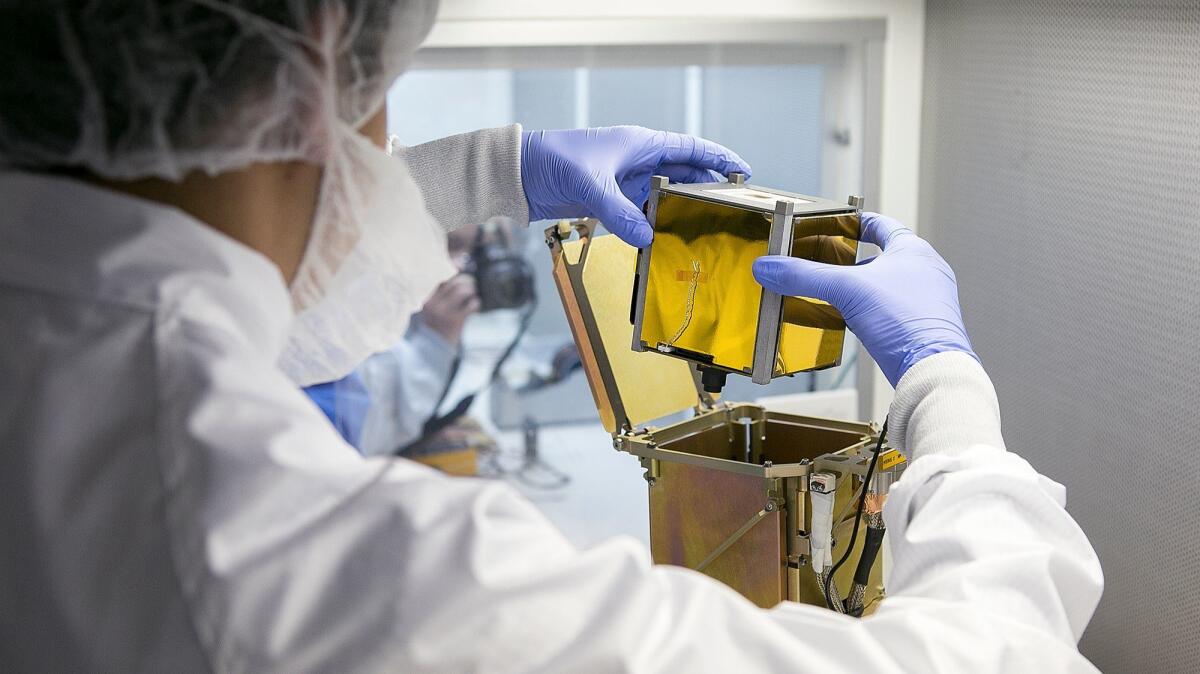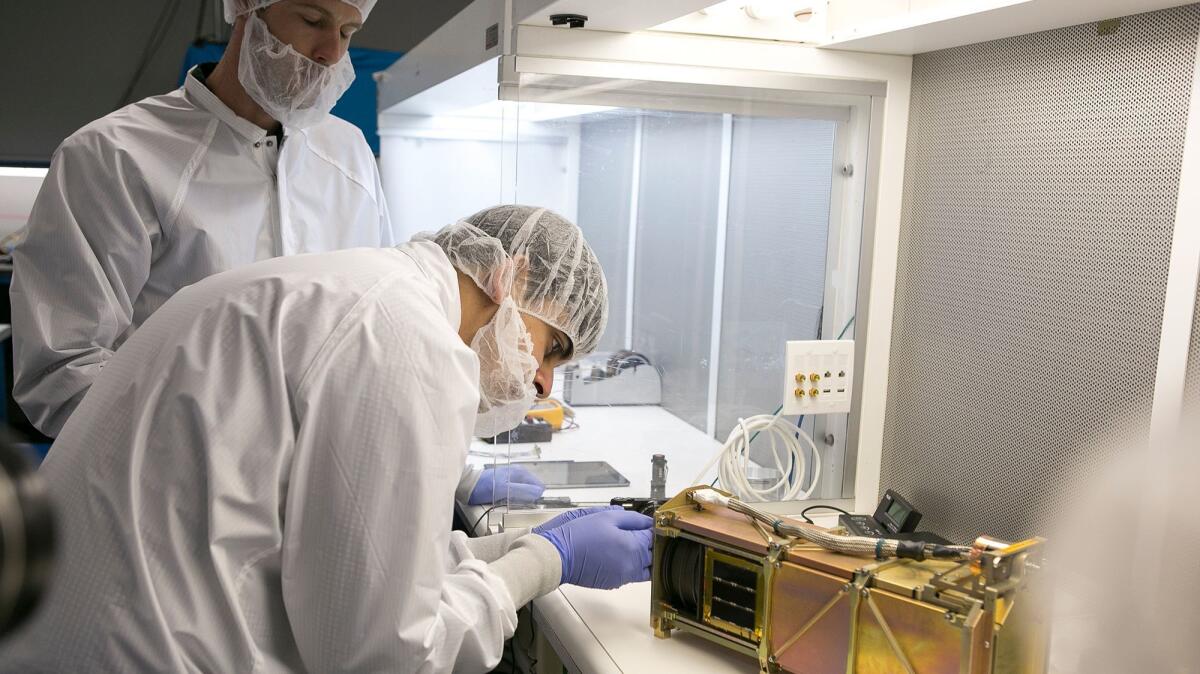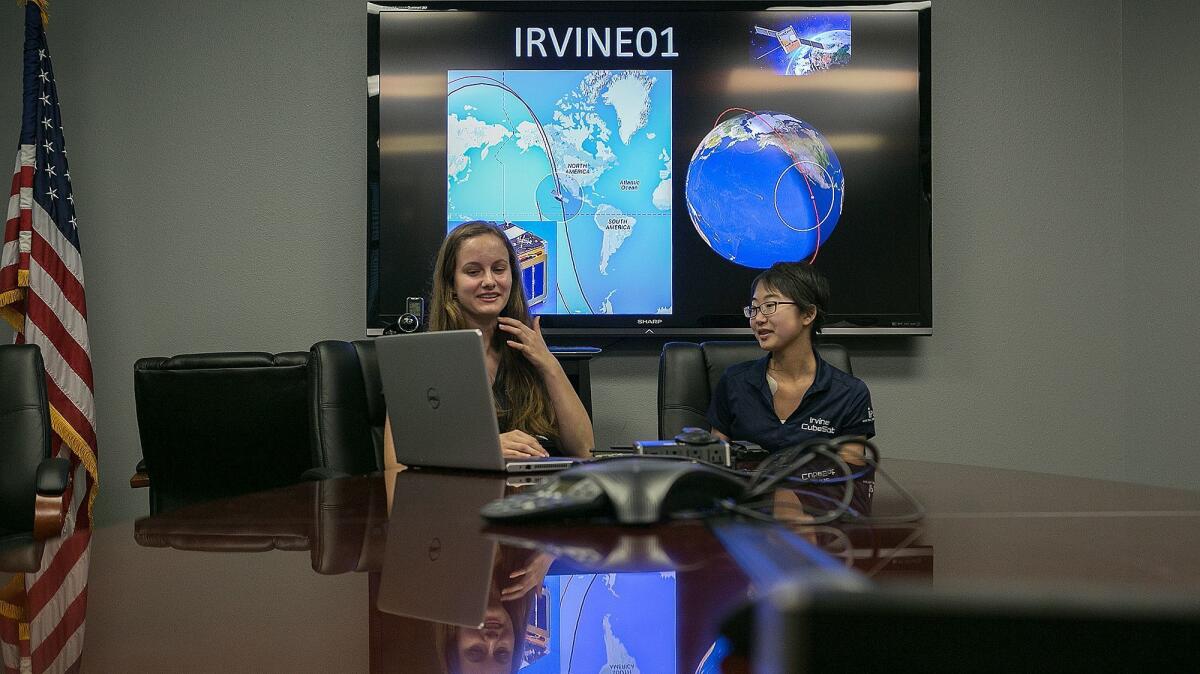Irvine students enter final phase of their mission to launch a satellite
- Share via
Mission almost complete.
For over a year, more than 100 students in Irvine have focused on Irvine01, a mission to engineer and launch a nano-satellite into orbit.
Last month, they entered the project’s final phase at Tyvak Nano-Satellite Systems, Inc. in Irvine, which involved integrating their satellite, known as the CubeSat, into a dispenser that will attach to a launch vehicle and send the device into space.
As part of the Irvine CubeSat STEM program, the students are attempting the first successful high school-based CubeSat launch on the West Coast, according to a news release.
While it’s in orbit, the 10-centimeter-by-10-centimeter cube will be capable of taking photos and sending communications to the students. It’s equipped with pieces such as a small camera and solar panels.
After suiting up in white lab coats and hair nets, a few students on the project worked alongside Tyvak engineers during the launch integration last month to strategically place the cube into the rectangular-shaped dispenser.
The dispenser will be sent to India, where the cube will be launched later this year.

Each of the high schools in the program — Beckman, Woodbridge, Northwood, Irvine and University — had a team that worked on a different aspect of the cube’s mission with the guidance of industry mentors.
“As a student, it can be a bit scary to work with a professional,” said Irvine student Mehr Bawa. “I’ve learned that sometimes we won’t find the answers through the problems, but it’s all about working as a team and being able to solve those problems together.”
Students at Beckman — the only participating school from Tustin Unified School District — handled the cube’s electronics and sensor suite, which includes the GPS navigation.
Woodbridge students focused on radio operations and how data and communication can flow from the cube while in orbit.
Northwood students offered their talents to the solar panel and lithium battery functions while Irvine students put their knowledge to use on the propulsion system.
Students from University were in charge of the frame for the satellite and the government paperwork needed to launch the device into orbit.

“Between the collaboration with different people, I was mostly on the paperwork side of the team and as a 15-year-old, that’s huge,” University student Jessica Lin said. “I had a lot of exposure to the science community that I didn’t know about beforehand.”
Portola High School in Irvine, which opened last year, will be involved in the next mission of the program called Irvine02, which will have one of the 34 small satellites selected nationwide to participate in NASA’s CubeSat Launch Initiative to fly on an upcoming NASA-sponsored mission, according to a news release.
“The kids see each other as real colleagues,” said University math and engineering teacher Archana Jain. “Getting to this point of integration is huge. We expected the students to do well and they exceed our expectations one million percent.”
In addition to bringing the satellite to the Tyvak campus last month, the students also displayed a model of the cube, with the inside revealing different colored wires and layers of circuit boards and the outside showing sleek solar panels lining its sides.

The idea for the Irvine CubeSat program came about between mechanical engineer Brent Freeze and data scientist Kevin Sosa, who are both Irvine residents.
“We wanted to do something big in STEM that was city-wide,” Freeze said.
The two approached the Irvine Public Schools Foundation, which provided $150,000 in seed funding for the first mission, plus a commitment to raise funds and administer the program yearly.
“We’re hoping to expand to different school districts so that even more students have an opportunity to go through this as well,” Sosa said. “A lot of STEM programs have a focus on robotics and programming. The main purpose for us is to create a program with an interest in space.”
Twitter: @AlexandraChan10
All the latest on Orange County from Orange County.
Get our free TimesOC newsletter.
You may occasionally receive promotional content from the Daily Pilot.




